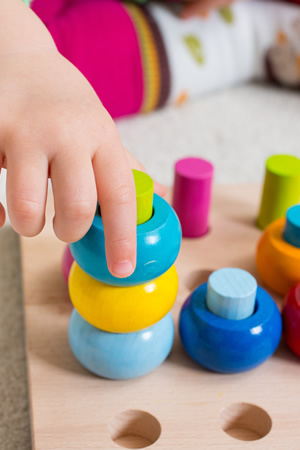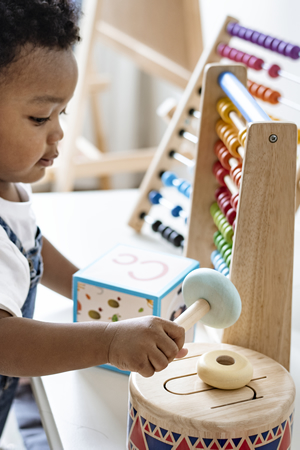

Camilla’s Place Family Childcare, LLC utilizes an eclectic philosophical early childhood education and family childcare approach that incorporates the following well known, effective, and evidenced based early childhood program philosophical approaches: Play Based Philosophy: Playing to Learn/Learning to Play, Montessori, Waldorf , Reggio Emilia Approach, and Cognitive Based Philosophy, as well as incorporates the theories, principles, and procedures of the science of Applied Behavior Analysis (ABA).
High quality early childhood programs teach children to think creatively so they may succeed in a complex and ever-changing world. Purposeful play is developmentally appropriate and a significant element of any early childhood education and family childcare program. The following emphasizes the importance of play in a child’s intellectual, social, emotional, and physical development.
Play is a way of learning for children. During a typical early childhood education and family childcare program, service day there will be structured and unstructured periods, enabling children to learn at their own rate.
 Values that support learning through play include:
Values that support learning through play include:
Learning environments support purposeful play by incorporating and utilizing the following educational play materials and supplies into regular programming:
Montessori is both a philosophy and a method of educating children created by Maria Montessori, the first female physician in Italy. It is based on the belief that children have a natural desire to learn, and when they are placed in an enriched environment with specially designed materials and highly trained early childhood education and family childcare providers and staff, they learn quickly and easily through hands on experience. Maria Montessori began work in the slums of Rome and through careful observation of the children in her care she discovered how to help children learn about self-care, math, language, cultural studies, and size, shape, colors, etc. Montessori traveled throughout the world introducing her systems to educators and parents everywhere. She was nominated for the Nobel Prize three times.
For more information on the Montessori Philosophical Approach click on and read the following links: www.rosehallmontessori.org; www.chiaravalle.org
Chicago Waldorf School is an urban independent school offering early childhood education through twelfth grade education that is rooted in the ideals, insights, and pedagogical methods of Rudolf Steiner, philosopher, social innovator, and artist. The school provides a diverse student body with an education that supports the development of free thinking, self-directed young adults, ready to embark on the next phase of their education, and eager to contribute positively to our world and the global society of the 21st century. Many parents visiting a Chicago Waldorf School Early Childhood. Education class feel an instant, intuitive connection with it, often saying, "I wish I had gone to a school like this.” The room is warm, colorful, cared-for, and filled with nature’s beauty and variety, a place where children can let their imaginations roam while feeling reassured and protected.
Play is at the heart of the Waldorf Early Childhood Education program. Children develop the capacity for creative thinking, problem-solving abilities, and social skills through their free imaginative play. Simple, natural materials, such as pieces of wood, seashells, beeswax, and handcrafted toys, encourages children to form their own games and stories.
For more information on the Waldorf Philosophical Approach click on and read the following link: www.chicagowaldorf.org
 REGGIO EMILIA PHILISOPHICAL APPROACH
REGGIO EMILIA PHILISOPHICAL APPROACHThe Reggio Emilia Philosophical Approach to early childhood education and care was started by the schools of Reggio Emilia, a city in Italy, after World War II and has become renowned as one of the best educational systems in the world. This approach places emphasis on the arts as children’s symbolic language and an engaging learning environment. The concept of equal collaboration is very important to the success of Reggio Emilia Schools. In these schools, early childhood education and childcare providers, staff, teachers, parents, and children, along with the community are seen as co-constructors of knowledge. In Reggio Emilia Schools, parents and/or legal guardians are considered equal partners with providers, staff, and teachers in their children’s education. Parents are respected and valued and are expected to be involved with both the school and in the classroom. Parents take part in discussions about school policy, child development concerns, and curriculum planning and evaluation. Since a majority of parents are employed, meetings are held in the evenings so that all parents can attend.
For more information on the Reggio Emilia Philosophical Approach click on and read the following link:
http://www2.colum.edu/ilpirc/informationforparents.php
In a program which is cognitive based, young children learn through active exploration within an environment that is rich in materials and opportunities to converse, socialize, work, play, and negotiate with others. The classroom[s] are set-up and planned to encourage and facilitate child curiosity, exploration, and problem solving within an atmosphere of warmth, affection, and respect for each child. Providers, staff, and teachers plan experiences based on children family childcare program participants’ interests and appropriate educational concepts.
Children may work individually or collaboratively, and may choose whether or not to participate within a given project or activity. Children are actively involved in experiences that include foundations of math, science, social studies, creative arts, language arts, music, and movement and dramatic play. All interrelated aspects of the child’s growth and development are considered intellectual, social, emotional, physical, and creative. Activities, experiences and adult (provider, staff, and/or teacher)-child interactions are constantly being measured and evaluated in terms of the following early childhood education and family childcare program service goals:
For more information on the Cognitive Based Philosophical Approach click on and read the following link:
http://goforward.harpercollege.edu
Behavior analysis is the science of behavior, with a history extending back to the early 20th century. Its guiding philosophy is behaviorism, which is based on the premise that attempts to improve the human condition through behavior change, such as education and behavioral health treatment will be most effective if behavior itself is the primary focus.
To date, behavior-analytic scientists have conducted thousands of studies to identify the laws of behavior, the predictable ways in which behavior is learned and how behavior changes over time. The underlying theme of much of this work has been that behavior is a product of its circumstances, particularly the events that immediately follow the behavior. Behavior analysts have used this information to develop numerous techniques and treatment approaches for analyzing and changing behavior, and ultimately, to significantly improve lives. Because of this approach, applied behavior analysis (ABA) is largely based on behavior and its consequences, techniques generally involve teaching children more effective ways of behaving and working to change the social consequences of the child’s existing problematic and/or maladaptive behavior[s]. Treatment approaches that are based on ABA have been empirically shown to be effective with and in a wide variety of individuals and settings. However, because ABA was first applied to the treatment of individuals with intellectual disabilities and autism spectrum disorder (ASD) diagnoses, this practice area has the largest evidence base, as well as has received the most positive recognition.
For more information on the Behavior Analysis and/or Applied Behavior Analysis (ABA) Scientific Approach click on and read the following link: https://www.bacb.com
Camilla’s Place Family Childcare, LLC’s (CPFC’s) mission is to provide a safe, supportive, nurturing, learning rich and engaging early childhood education and family childcare environment that effectively supports and encourages healthy growth, optimal development, and supports the diverse needs of each enrolled child program participant that creates a foundation for children to be able to enter Kindergarten and/or First Grade as a lifelong learner and a critically-thinking citizen by providing effective high-quality evidenced based early childhood education and family childcare program services and resources to the children, families, and communities in which we serve.
Camilla’s Place Family Childcare, LLC’s (CPFC’s) vision is to create an effective and supportive path that leads to the lifelong development and well-being for young children ages birth to age six (6) that provides them with multiple optimal opportunities to learn and the supports necessary to reach their full potential. CPFC views effective high-quality evidenced based early childhood education and family childcare program services as a solid first step on the path towards this vision. CPFC further envisions a world in which the diversity of today’s young children is considered an asset for building a strong and productive society and is therefore celebrated.
 OUR CORE VALUES & CORE BELIEFS
OUR CORE VALUES & CORE BELIEFSCamilla’s Place Family Childcare, LLC’s (CPFC’s) core values are defined in the NAEYC Code of Ethical Conduct and are deeply rooted within the early childhood education and family childcare field and profession. In addition, CPFC seeks to be a high–performing, inclusive early childhood education and family childcare organization that is enhanced by and continually grows and improves from our commitment to diversity, as embodied by our core values and beliefs.
Camilla’s Place Family Childcare, LLC (CPFC) upholds the following core beliefs and values within and across all our interactions and initiatives:


